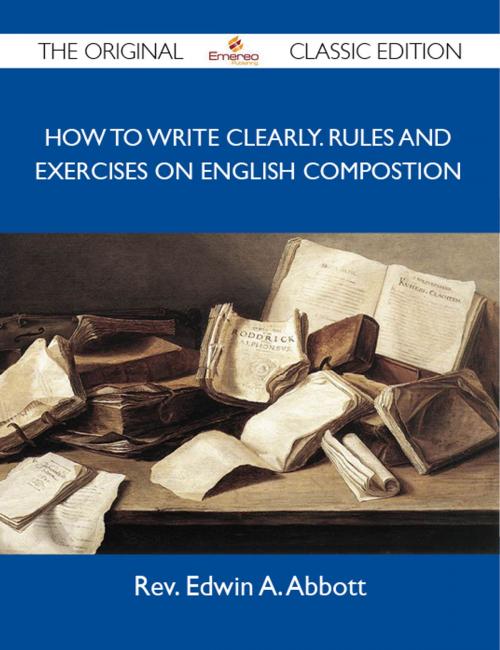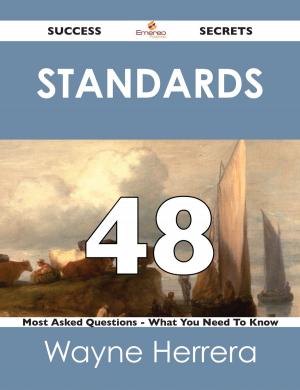How to Write Clearly. Rules and Exercises on English Compostion - The Original Classic Edition
Nonfiction, Reference & Language, Reference, Fiction & Literature| Author: | Abbott Rev | ISBN: | 9781486417919 |
| Publisher: | Emereo Publishing | Publication: | October 24, 2012 |
| Imprint: | Emereo Publishing | Language: | English |
| Author: | Abbott Rev |
| ISBN: | 9781486417919 |
| Publisher: | Emereo Publishing |
| Publication: | October 24, 2012 |
| Imprint: | Emereo Publishing |
| Language: | English |
Finally available, a high quality book of the original classic edition.
This is a new and freshly published edition of this culturally important work, which is now, at last, again available to you.
Enjoy this classic work today. These selected paragraphs distill the contents and give you a quick look inside:
Thus, the place for an adverb, as a rule, should be between the subject and verb: He quickly left the room; but if quickly is to be emphatic, it must come at the beginning or end, as in I told him to leave the room slowly, but he left quickly.
...Suspense is caused (1) by placing the if-clause first, and not last, in a conditional sentence; (2) by placing participles before the words they qualify; (3) by using suspensive conjunctions, e.g. not only, either, partly, on the one hand, in the first place, &c.
...The introduction of a clause with if or though in the middle of a sentence may often cause ambiguity, especially when a great part of the sentence depends on that: His enemies answered that, for the sake of preserving the public peace, they would keep quiet for the present, though he declared that cowardice was the motive of the delay, and that for this reason they would put off the trial to a more convenient season.
...The connection between different sentences must be kept up by Adverbs used as Conjunctions, or by means of some other connecting words at the beginning of each sentence.-Leave out the conjunctions and other connecting words, and it will be seen that the following sentences lose much of their meaning:-
...Pym was looked upon as the man of greatest experience in parliaments, where he had (50) served very long, and was always (50) a man of business, (7) being an officer in the Exchequer, (43) and of a good reputation generally, (30) though known to be inclined to the Puritan party; yet not of those furious resolutions against the Church as the other leading men were, and (44) wholly devoted to the Earl of Bedford, who had nothing of that spirit.
Finally available, a high quality book of the original classic edition.
This is a new and freshly published edition of this culturally important work, which is now, at last, again available to you.
Enjoy this classic work today. These selected paragraphs distill the contents and give you a quick look inside:
Thus, the place for an adverb, as a rule, should be between the subject and verb: He quickly left the room; but if quickly is to be emphatic, it must come at the beginning or end, as in I told him to leave the room slowly, but he left quickly.
...Suspense is caused (1) by placing the if-clause first, and not last, in a conditional sentence; (2) by placing participles before the words they qualify; (3) by using suspensive conjunctions, e.g. not only, either, partly, on the one hand, in the first place, &c.
...The introduction of a clause with if or though in the middle of a sentence may often cause ambiguity, especially when a great part of the sentence depends on that: His enemies answered that, for the sake of preserving the public peace, they would keep quiet for the present, though he declared that cowardice was the motive of the delay, and that for this reason they would put off the trial to a more convenient season.
...The connection between different sentences must be kept up by Adverbs used as Conjunctions, or by means of some other connecting words at the beginning of each sentence.-Leave out the conjunctions and other connecting words, and it will be seen that the following sentences lose much of their meaning:-
...Pym was looked upon as the man of greatest experience in parliaments, where he had (50) served very long, and was always (50) a man of business, (7) being an officer in the Exchequer, (43) and of a good reputation generally, (30) though known to be inclined to the Puritan party; yet not of those furious resolutions against the Church as the other leading men were, and (44) wholly devoted to the Earl of Bedford, who had nothing of that spirit.















